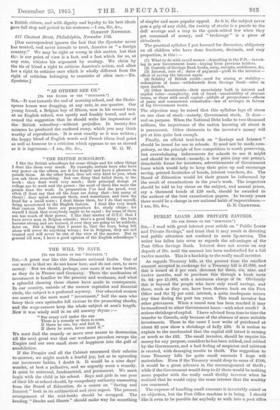THE WILL TO SAVE. (To THE EDITOR OP TIIR "
SPEOTATOR. ") Sm,—A great war like this illumines national faults. One of our worst is that wo do not know how, and do not care, to save money. But we should, perhaps, care more if we knew better, as they do in France and Germany. There the mechanism of investment is familiar to the peasant and workman, and what a splendid showing those classes have made in consequence. In our country, outside of the narrow capitalist and financial circle, the subject is a profound mystery. Our educated woniert are soared at the mere word " investment," half the men who fancy their own aptitudes fall victims to the promoting sharks, and the wage-earners keep the whole subject at arm's length. Now it was wisely said in an old nursery rhyme :—
" For every evil under the sun There is a remedy or there is none. If there be one, try and find it, If there be none, never mind it."
We must find the remedy or move ever nearer to destruction till the next great war that our weakness provokes sweeps the Empire and our own small store of happiness into the gulf of annihilation.
If the Premier and all the Cabinet renounced their salaries
to-morrow, we might snatch a fearful joy, but as to uprooting our inveterate habits, I doubt it. It would be a nine days' wonder, at best a palliative, and we urgently want a remedy. It Must be universal, fundamental, and permanent. We must bcgiva with the child in his school. Boys and girls in one year of their life at school should, by compulsory authority emanating, from the Board of Education, do a course on " Saving and. Interest " both in its arithmetical and civic aspect. The present arrangement of the text-books should be scrapped. The heading " Stocks and Shares " should make way for something
of simpler and more popular appeal. As it is, the subject never gets a grip of any child, the variety of stocks is a puzzle to the dull average and a trap to the quick-witted few when they get command of money, and " brokerage " is a piece of chinoiserie.
Tho practical syllabus I put forward for discussion, obligatory on all children who have done fractions, decimals, and easy proportion, is this :-
(1) What to do with saved money—depositing in the P.O.—invest- ing in new Government loans—buying from previous holders.
(2) Custody of Savings Bank books, scrip, receipts, certificates, &e. (3) Interest, rate of ; dates of payment—yield to the investor— effect of saving the interest again. (4) Solidity of British credit—need for aiming at stability— redemption of loans—withdrawals from Savings Bank—sales in open market.
(5) Other investments—their uncertainty both in interest and capital value—complexity, risk of fraud—unsaleability of obsoure issues, or those with small capital—pitfalls of prospectuses—effects of panic and commercial vicissitudes—law of averages in favour of big Government issues.
The objection may be raised that this syllabus lays all stress on one class of stock—namely, Government stock. It does— and on purpose. When the National Debt bulks to two thousand millions, the importance of the nation knowing all about it is paramount. Other claimants to the investor's money will get at him quite fast enough.
Finally, an official text-book on " Savings and Interest " should be issued for use in schools. It need not be mado, com- pulsory, as the principle of free competition is worth preserving,
but overwhelming inducements for schools to use it might and should be devised—namely, a low price (say one penny), detachable forms for investors, advertisements of Government loans which would help to keep their price up and encourage
saving, printed facsimiles of bonds, interest vouchers, &a The Board of Education would let their grants be influenced by the result of examinations in the year's work. The inspectors should be told to lay stress on the subject, and annual prizes, say a thousand bonds of £20 each, should be awarded to the authors of the best examination papers. In twenty 'years there would be a change in our national habit of improvidence.—


































 Previous page
Previous page